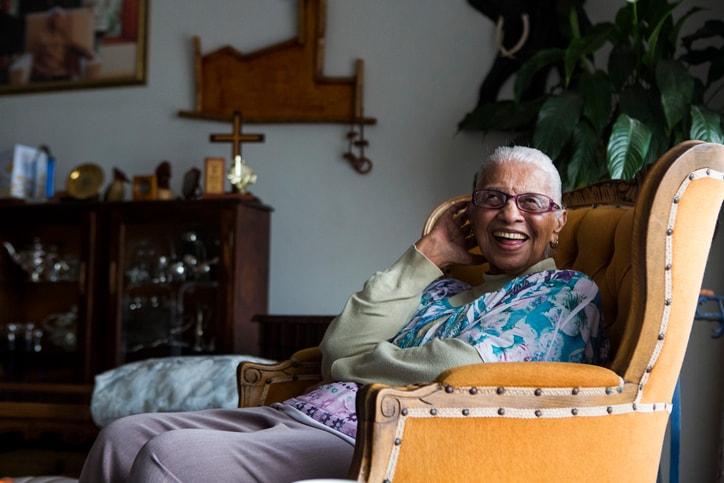In this article
We might think of games as a fun childhood activity or something we do at a dinner party with friends over drinks and laughs. But games can actually offer numerous healthy benefits — and this is especially the case for seniors with dementia.
“Finding appropriate ways for family caregivers to engage a family member living with dementia can take many forms, including games,” says Monica Moreno, senior director of care and support at Alzheimer’s Association. People living with dementia experience a decline in physical and cognitive skills, Moreno says, and games can be enjoyable, useful and skill-strengthening activities to have in your caregiver toolbelt.
If you need ideas on what games to offer a loved one with dementia, try one of these research-backed and expert-recommended picks, based on the senior’s current needs and abilities.
Key takeaways
- Games can help seniors with dementia by boosting memory, social connection and mental engagement.
- Experts suggest using familiar, adaptable games based on the person’s abilities.
- Even simple games can improve quality of life for both patients and caregivers.
How to choose games for people with dementia
First, be aware that as any dementia condition, like Alzheimer’s disease, progresses, symptoms change over time, though a senior’s memory, mood and behavior can also fluctuate daily. That said, for the best experience, family caregivers should aim to meet the senior where they are, and when possible, be flexible and adapt games and activities depending on the disease progression.
You might find some games that you’ve already played together, or introduced during early stages of dementia, can remain staples over time, even as dementia worsens. “Some games may offer various skill levels, which can keep the caregiver, other family members and the care recipient engaged at cognitively-appropriate levels,” Moreno says.
But it bears noting that pushing the wrong type of game can backfire. “People living with dementia may experience trouble with memory, thinking, reasoning and language, which can make some games challenging, if not downright frustrating,” adds Moreno. So if a senior struggles with the speed of a card game, the hand-eye coordination required of a certain board game or runs into other issues, set it aside and try a different type of game.
“If games were a favorite pastime prior to a dementia diagnosis, chances are it will be something they still enjoyed at some level depending on disease progression.”
— Monica Moreno, Alzheimer’s support advocate
5 types of dementia games for seniors
Read on for a diverse array of research-backed games to try with your loved one.
Classic games for seniors with dementia
You don’t necessarily need to abandon games a senior with dementia has always loved to play. “If games were a favorite pastime prior to a dementia diagnosis, chances are it will be something they still enjoyed at some level depending on disease progression,” Moreno says. So ask what games your loved one enjoyed, or if they’re unsure, see if you can find any games around their home. Even a simple game of dominoes may trigger memories of how to play and any associated memories.
Classic games can be especially helpful for seniors whose dementia has progressed. “Learning a new game will be daunting for the patient so it’s best to stick with those that are familiar activities,” says Dr. Gary Small, an Alzheimer’s researcher, professor and academic chair of psychiatry at Hackensack Meridian School of Medicine.
Even old staples have benefits: “Playing games can even stimulate the patient’s neural circuits so they are more present emotionally and cognitively,” Small adds.
Social games for seniors with dementia
“Engaging in fun activities brings people together, and games are a way to connect with a dementia patient,” Small says. If your loved one has always enjoyed Solitaire, there’s nothing wrong with letting them go wild with a card deck or computer. But if the senior isn’t getting much social engagement elsewhere, look beyond single-player games to maximize benefits.
Given that most games require some personal or social interaction, Moreno says, “Games offer an opportunity to involve other family members and friends, allowing others to spend time with the person living with dementia.”
Even a simple card game like rummy, Old Maid or Go Fish with the family can offer mental stimulation alongside social interaction. Basic board games for two or more players and card games like Uno or dice games like Yahtzee — particularly ones the senior played before memory loss — could also incorporate social connection with game-playing.
Board games for seniors with dementia
Playing board games has positive impacts far beyond social connection, according to a 2020 research paper on how games can be therapeutic for dementia.
The paper found that board games do have limitations. Some require a lot of space, multiple players and a complex strategy that can be too challenging for dementia patients. But board games that hit the sweet spot, according to research, have a bevy of perks, such as:
- Enhancing a dementia patient’s thinking and reasoning abilities
- Keeping the brain active
- Supporting memory
- Boosting social skills
- Benefiting their tactile sense and hand flexibility and coordination if there are props (like game pieces)
Some games that have been studied and proven beneficial for dementia include checkers, Abacus and Go.
“During the early stages of dementia, word games, video games and even artificial intelligence technology can help stimulate the brain and keep people living with dementia engaged.”
— Monica Moreno
Memory and brain games for seniors with dementia
For seniors whose dementia hasn’t progressed significantly, intellectually stimulating activities can promote neuroplasticity and help slow cognitive and memory decline. “During the early stages of dementia, word games, video games and even artificial intelligence technology can help stimulate the brain and keep people living with dementia engaged,” Moreno says.
Small recommends crossword puzzles as a way to stimulate the brain and bolster cognitive abilities in dementia patients, as well as dice games to boost calculation and numerical skills. “Playing a simple game of trivia can help cognitive function, and it doesn’t require a ton of set-up,” adds Small. “Try making flashcards of everyday objects, and add new ones to the deck every visit.”
The Alzheimer’s Research Association has also found that many traditional games, in addition to being a fun way to pass the time, can benefit brains with dementia. Their studies show that word puzzles are excellent for language and cognition, while card games can benefit memory, concentration, reasoning and problem-solving.
But there are also games created specifically for dementia patients who need support in specific skills. The Alzheimer’s Store features numerous such board games and activities, such as Call-to-Mind, a well-researched game that helps start conversations and stimulate memories. There’s also one called All About Us, a board game designed by researchers to help those experiencing memory loss to recall their past.
Other options for supporting memory and brain stimulation include video games and digital brain training. There are paid options, plus free options like MentalUP or AARP’s Staying Sharp.
“Playing a simple game of trivia can help cognitive function, and it doesn’t require a ton of set-up. Try making flashcards of everyday objects, and add new ones to the deck every visit.”
— Dr. Gary Small, Alzheimer’s researcher and professor
Jigsaw puzzle games for seniors with dementia
You might not think of a jigsaw puzzle as a game, per se, but it is in the sense that it uses strategic thinking to complete a challenge or reach a goal. Plus, it’s flexible in that it can be done solo or with company and in whatever time frame works best for the senior.
Jigsaw puzzles can provide numerous perks for seniors with dementia, according to Alzheimer’s Research Association, including helping with memory recall and reasoning. Puzzles are affordable, come in a range of sizes and difficulties and can be found with just about any imagery you can think of. To enhance the experience, consider making a puzzle for the senior using a family photo they have memories of; you can make these yourself or order them online.
The importance of simple games for dementia patients
It may take some trial and error to find games that work for your loved one’s interests, skills and disease stage, but it pays off.
Beyond being a fun way for a senior and their family caregiver to spend time, games are thought to foster social connection, exercise intellect and concentration, stimulate recall and reasoning skills, elicit memories and even exercise hand-eye coordination.
On top of that, Small notes, participating in these games with a loved one also benefits the caregiver’s brain. “A recent study found that playing games, doing crosswords or puzzles, painting, drawing, listening to music and watching TV can lower a person’s future risk for developing dementia,” he adds.
Evidence is still gathering for some types of games and benefits, but don’t let that deter you, especially if you observe positive impacts. “More research is needed to fully understand the potential benefits of games on cognition,” Moreno says. “But engaging in games or other activities that keep a person intellectually and socially engaged is always worthwhile.”





